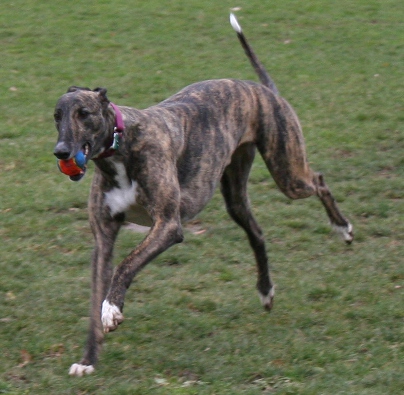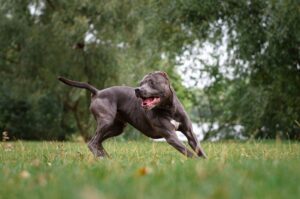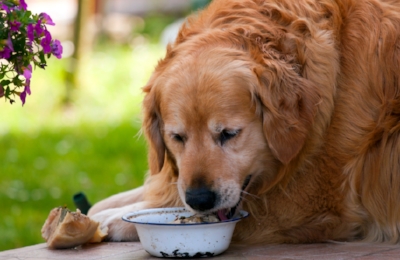
Did you know that Ayurveda is not only a system of medicine that is great for you, but something your pets can benefit from too! Fido can benefit just as much from the nutrition, lifestyle and herbal support as you can. But, first- What’s Your Pet’s Metabolic Type?
The doshas are the three metabolic forces that make up the mind and body. They are called Vata, Pitta and Kapha. Let’s see which dosha your pet is. I will talk about dogs, but the same principles can apply to your cat, bird, hamster or even snake!

The Vata Personality: A happy, friendly animal who is lively, energetic and finds it hard to stay one place for long time! Vata pets are generally good communicators. They are physically slender and small- framed, their chests are flat with their veins and muscle tendons visible. The skin is cool, rough, dry and cracked. Their eyes are normally small, dry, and they watch everything and their nails or claws are often rough and brittle. Their appetite and digestion are variable, sometimes eating everything and at other times leaving food in their bowl. Their stool is dry, hard, and there is not much of it. They are restless sleepers often waking in the early hours of the morning. Their paws are often cold and dry.Vata pets have short memories but quick mental understanding. They will understand something immediately, but will soon forget it. They sometimes lack determination, will tend toward mental instability, and are nervous, fearful at times, and prone to anxiety.
Typical health problems include hypertension, earaches, anxiety, irregular heart rhythms, muscle spasms, lower back pain, constipation, abdominal gas, diarrhea, nervous stomach and arthritis. Most neurological disorders are related to a Vata imbalance.
When Vata is balanced, you pet will be happy, have good energy, moves about with ease, easy to train and fun to be with and will exhibit:
When Vata is out of balance: It can manifest as fear, anxiety and nervousness and can exhibit:
Diet for your Vata pet. Vata pets run cool and dry and should avoid beans, cauliflower, broccoli, peppers, and potatoes. Feed them warming foods such as beef, along with washed and pureed carrots and squashes although they can be quickly blanched then pureed for enhanced digestion. Avoid ghee as it is hard for animals to digest and can lead to pancreatitis. (Use fish oil instead.) For pets experiencing digestive issues, they can be fed the Ayurvedic dish “kitchari” made with white basmati rice and mung beans. Spices can include black pepper, cumin and coriander, with a slight bit of hing for Vata dogs.

The Pitta Personality: Pitta dogs have a handsome personality and are generally the pack leaders. They are strong and fearless and can get along with cats easily. These pets are of medium build, have medium muscle tone and their body frame shows muscular strength. The fur is soft and warm and lustrous. The shape of the nose is sharp. These pets have a strong metabolism, good digestion and resulting strong appetites. Your Pitta pet is always ready to eat and can eat a lot of food. They are often thirsty and you may feel you are constantly filling up their water bowl. Their sleep is of medium duration but uninterrupted. They produce a large volume of urine. The body temperature may run slightly high, and their paws will tend to be warm. Pitta pets do not tolerate sunlight or heat well, preferring cooler places to seek out. Pitta pets have good powers of comprehension; they are highly intelligent and sharp, they like to use their brains, and will often be problem solvers. However, when under stress they can have tendencies toward irritability and jealousy.
Typical health problems include rashes or inflammations of the skin, acne, boils, skin cancer, ulcers, heartburn, acid stomach, hot sensations in the stomach or intestines, insomnia, bloodshot or burning eyes and other vision problems, anemia, jaundice.
When Pitta is balanced expect a dog with a happy disposition, sharp intellect, courage and strong drive to learn and will exhibit:
When Pitta is out of balance the happy Pitta mind can quickly turn into a angry dog and can exhibit:
Diet for your Pitta pet. As Pitta dogs tend to run warm, avoid foods that provoke warmth. They do well with cooling foods including meats such as duck, and chicken breasts; dairy products such as cottage cheese, and even tofu. Fresh pureed veggies such as leafy greens are beneficial as well.

The Kapha Personality: Kapha dogs are possessive, even-tempered, reliable and love to eat! Kapha pets have well-developed bodies that have a tendency towards putting on too much weight. They have large bones, a broad body and are well covered in a layer of fat. They often have good musculature and thick, soft and lustrous fur that tends towards oiliness. They have large and attractive eyes – in fact your pet overall will be very attractive. Kapha pets have regular appetites and due to their slow digestion, they tend to consume less food. They have a slower metabolism and sleep often and deep. Your pet is generally healthy, happy, content, easy-going and peaceful. Kapha pets tend to be tolerant, calm, forgiving, and loving: however, they also exhibit traits of greed, attachment and possessiveness. Their comprehension is slow but definite: once they understand something, you will never have to teach it again.
When Kapha is in balance they are calm, loving, and patient companions and will exhibit:
When Kapha is out of balance, the calm and patient dog can transform into a lazy dog, and this will lead to weight gain and may exhibit:
Diet for your Kapha pet: For the heavy-set Kapha pet, the diet should contain more wholesome foods such as fresh veggies. Avoid starch, grains and fat, and additives such as molasses and corn syrup. Veggies should include carrots, squash and pumpkin and should always be washed, raw and pureed.
The most common herbs and spices for pets include turmeric, cumin and coriander powders for balancing digestion. Try dried or fresh ginger for Vata pets, cumin and coriander for Pitta, and turmeric for Kapha. Take care not to be overindulge, as a 60 lb. dog only needs 1/8 of a teaspoon of any given herb.
Here’s a list of the most common Ayurvedic herbal remedies that are safe and effective for dogs that Dogs Naturally highlighted.
Ashwagandha (Withania somnifera)
Ashwagandha has been used since ancient times to promote health and longevity. Its active principles (alkaloids and withanoloides) are similar to those of ginseng. Like ginseng, ashwagandha is revered for its anti-aging properties. Specifically, it is used to enhance the immune system and treat anemia, inflammation, bacterial infection, and diarrhea. It is also thought to improve the quality of bodily tissues. Clinical research shows that ashwagandha helps relieve general aches and pains. Ashwagandha is an excellent hematinic and contains high levels of iron and free amino acids such as glycine, valine, tyrosine, proline, and alanine. Moreover, this herb has been shown to be safe for long-term use. Research shows that ashwagandha has anti-inflammatory, diuretic, sedative, antibacterial, and anti-fungal activity. It also has anti-tumorigenic uses in animals.
Dosage: 500 mg- 1500 mg twice daily for dogs and 200 – 500 mg twice daily for cats.
Amla (Emblica officinalis)
Amla fruit (Emblica officinalis), also known as Indian gooseberry, is one of the richest sources of bioflavonoids and Vitamin C. Native to India, this plum-sized fruit is revered for its anti-aging and immune system-enhancing properties. Each amla fruit contains up to 700 mg of Vitamin C. This natural ascorbate is synergistically enhanced by the bioflavonoids and polyphenols contained in each fruit. In fact, research has shown that the potency of the 8.7 mg of natural Vitamin C complex in amla is equivalent to 100 mg of the most commonly used synthetic Vitamin C. It is interesting to note that the natural ellagic and gallic acids in amla protect the Vitamin C from oxidation and increase its potency. Amla has traditionally been combined with several other herbs and spices. In traditional Ayurvedic medicine, it has been particularly indicated for anemia, asthma, bleeding gums, diabetes, colds, chronic lung disease, hyperlipidemia, hypertension, yeast infections, and cancer. It also increases lean body mass, accelerates the repair and regeneration of connective tissue, and enhances interferon and corticosteroid production. Amla also acts as an antacid and anti-tumorigenic agent. In addition, it increases protein synthesis, and is this useful in cases of hypoglycemia. Amla is more beneficial than was previously imagined.
Dosage: 500 – 1000 mg every 12 hours for dogs and 100 – 250 mg for every 12 hours for cats.
Boswellia serrata
The gummy extract of Boswellia serrata, a centuries-old botanical remedy, has recently been hailed by modern scientific research for its powerful anti-inflammatory effects. Boswellia shrinks inflamed tissue by improving the blood supply to the affected area and enhances the repair of damaged blood vessels. Boswellic acid, an active ingredient in boswellia, blocks synthesis of proinflammatory 5-lipoxygenase products including 5-HETE and LTB4, thereby reducing fever and pain, and inhibiting various inflammatory diseases. Both clinical and experimental trials of Boswellia serrata indicate that it produces none of the side effects (gastric irritation, ulcers, and the negative effect on the heart rate and blood pressure) associated with most anti-inflammatory and anti-arthritic drugs, or even minor irritations.
Dosage: 500 – 1000 every 12 hours for dogs and 75 – 150 mg liquid every 12 hours for cats.
Bacopa
Bacopa monniera (also known as brahmi which, in Sanskrit, means Creator) is a small creeping herb commonly growing in marshy areas throughout India up to 2,000 feet above sea level. In Ayurvedic medicine, it is considered astringent, bitter, cooling, and is well-known as a brain tonic that improves the intellect. It has also been used for the treatment of respiratory diseases such as asthma as well as other diseases such as epilepsy, seizure disorders, anxiety, and cognitive dysfunction.
Dosage: Should be given with food. For dogs, give up to 250 mg a day, for cats give 100 mg a day.
Turmeric (Curcuma longa)
Turmeric can be used as a fresh green rhizome or a powdered dry rhizome. Curcuma longa has been believed to possess great healing powers. It is a common practice to give Curcuma longa in any case of trauma or accident to the person even before seeking any medical help. It works on all tissues of the body, but has its great activity on digestive, circulatory, and respiratory
systems. It is a very strong anti-inflammatory (even more potent than phenylbutazone and other NSAIDS) in cases of bruises and arthritis. It provides excellent hepatoprotection against liver stagnation and cholestasis. Turmeric purifies blood, relieves stagnation, and is believed to be a free radical scavenger and a potent anti-neoplastic agent. It has good anti-microbial activity without any side effects. Turmeric has been known to reduce the side effects of chemotherapy. It is believed to inhibit inflammation by inhibiting cyclooxygenase and lipoxygenase pathways. Hence it can be beneficial in IBD, liver problems, arthritis, respiratory problems, and inflammatory conditions.
Dosage: Curcumin can be given mixed with soft food, or can be added to home cooking. It has no taste but it colors the food. Whole turmeric can be given at a dosage of ½ to 1 tsp to dogs, and ¼ of a tsp twice daily to cats. Turmeric has the active alkaloid curcumin. This active principle can be given to dogs in the dosage of 250 mg every 12 hours and 100 mg every 12 hours in cats.
Beef Stew from https://www.moneycrashers.com/homemade-dog-food-treat-recipes/
This dog-approved version of beef stew includes meat for protein, vegetables for vitamins, and gravy for flavor. This is a good alternative to wet commercial dog foods.
Ingredients
Directions
Cook the sweet potato in a microwave for 5 to 8 minutes until firm but tender. Set aside.
Slice the stew pieces into smaller chunks, about the size of a nickel. Cook the stew pieces in a tablespoon of vegetable oil over medium heat for 10-15 minutes or until well-done. Remove the beef chunks from the pan, reserving the drippings.
Dice the sweet potato.
Heat the drippings over medium-low heat. Slowly add flour and water into the dripping while whisking to create a thick gravy.
Add the meat, sweet potato, carrots, and green beans into the gravy and stir to coat. Cook until the carrots are tender – about 10 minutes.
Serve cool — store remaining stew in the fridge for up to five days.
Just remember most Ayurvedic principles that can apply to humans also apply to your pets. Please provide them with an environment and the nutrition that balances their dosha. Once you do that, they are sure to become a balanced and joyful member of your family.
If you would like more information on how Ayurveda can help balance you – not just your pet, set up a complimentary consultation below.
In health,


The Holistic HIghway integrates traditional Western medical practices with Ayurveda medicine, creating a focus on prevention through nutrition, diet, and exercise; use of the latest genetic testing and other diagnostic techniques; and prescribed combinations of botanical medicines, supplements, therapeutic diets, detoxification programs, or stress-management techniques.

Integrative Health Expert | Ayurveda Practitioner | Author | Speaker
Kerry is a globally recognized leader in integrative medicine and the science of health known as Ayurveda. She is passionate about raising awareness of the need for a change in contemporary medicine that focuses on patient empowerment and a health-based (rather than disease-based) medical system.
Kerry is connected with The University of Pittsburgh Center for Integrative Medicine and remains a pioneer in the field of integrative medicine where she has developed a personalized system to manage chronic disorders by incorporating fundamental changes in diet, behavior, and stress while focusing on genetics.
This individualized program is so successful that many of her clients have achieved maximum healing and vitality after years of chronic problems!
More to Explore
Contact
Disclaimer
The sole purpose of all the website content is to educate and provide information about Integrative Health, Genetics and Ayurveda.This information is not intended for use in the diagnosis, treatment, cure. or prevention of any disease.
Stay Connected
7 Responses
Is khichdi a good thing to feed my dog?
Hi Lydia, I d recommend kitchari for Vata type dogs. However, no ghee. Use fish oil instead.
Hope that helps,
Kerry
Can the consultant you provide be used for dogs?
Hello, thank you for reaching out. I am sorry but it is beyond my scope to treat animals. However, there are many holistic veterinarians that will have Ayurveda training. You can google a holistic vet and see if there is someone in your area. I wish you luck.
Warmly,
Kerry
Hey Kerry,
I’ve an Indian Pariah, 5 month old pupper! What kind of dog is he? What should I incorporate in his diet?
Thanks!
Hello,
I can’t give specific recommendations for your puppy as I am not a vet and also not able to meet your puppy. I would recommend you find a holistic veterinarian to help you further do the best things for the health of your puppy. I hope that helps…
Are you an Ayurvedic doctor? Any consultation times….?